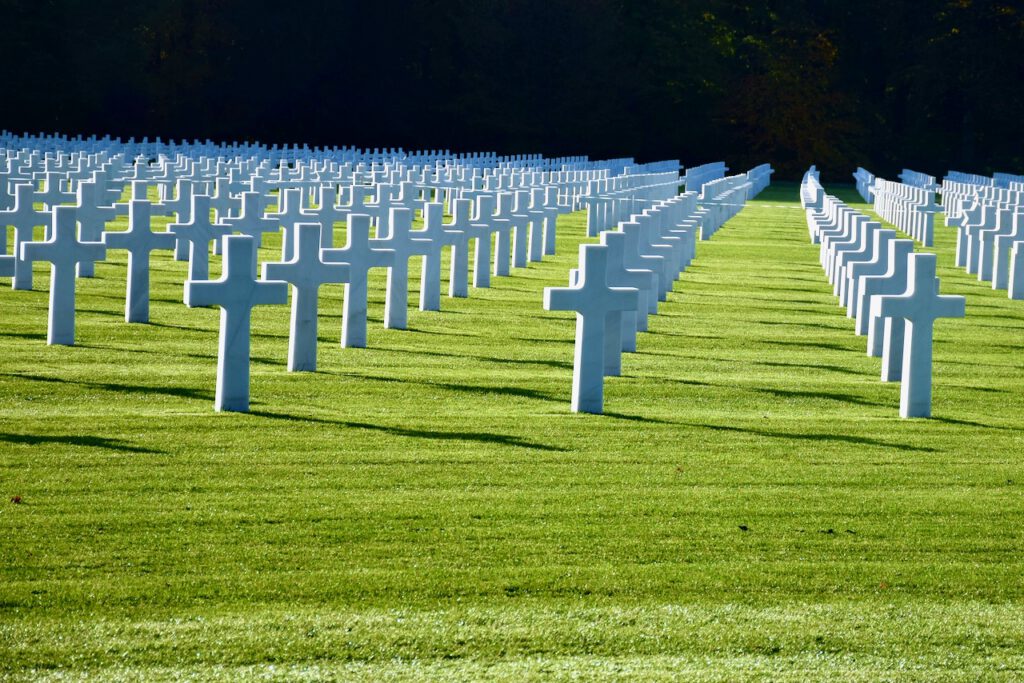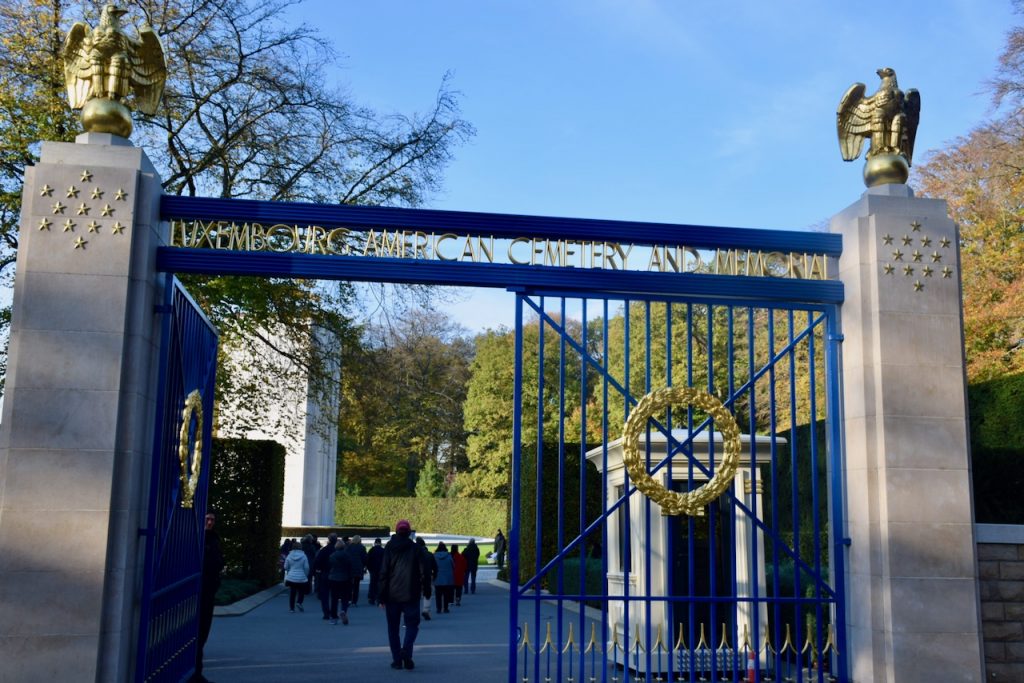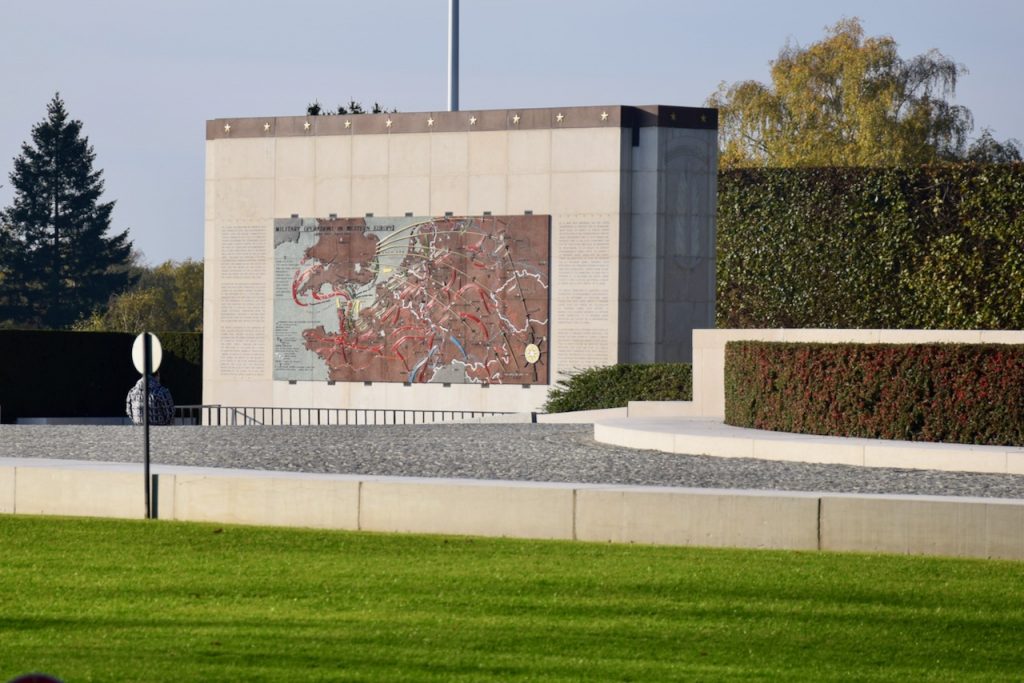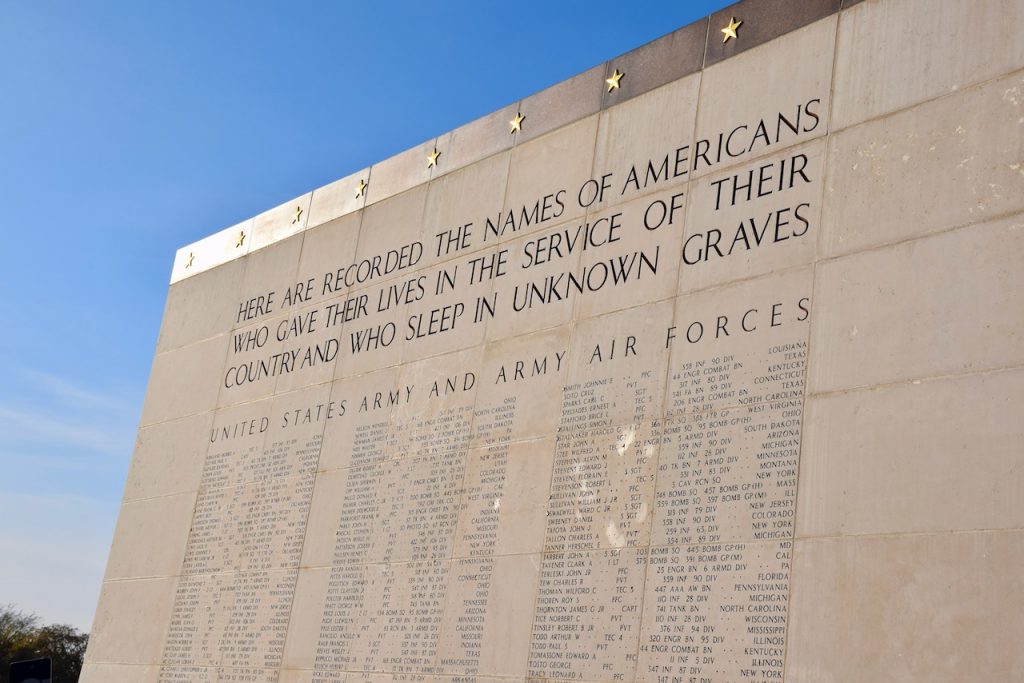Last year I my mother and I went on an adventure down the Mosel, Rhine, and Main rivers on a ten-day Uniworld river cruise. What fun we had gazing at castles, tasting the lovely Mosel wines, and discovering the beauty of yellow grape leaves in the vineyards planted along the steep banks of the rivers. One of our excursions was to the American Cemetery in the tiny country of Luxembourg.
Honestly, I knew very little about Luxembourg except that it was a small country between France, Germany, and Belgium. I knew even less about the American Cemetery there. I thought it would be a good excursion for Mom because she’s the history buff in the family. Since my Grandpa and his brothers served in WWII, she’d enjoy the historical significance. I didn’t realize the very real personal significance the American Cemetery and most importantly, this area of the world had for me.
We pulled up to the gates of the American Cemetery and wandered off the bus and through the golden eagle topped gates. I am not sure what I expected, but I was caught a bit off guard with how moving the quiet cemetery was for me. As I looked around, I saw large monuments dedicated to those who fought in this area during WWII. As we moved closer to the monuments, I came to understand what my Mom already knew. This was a big deal.
See, not far from the grounds of the American Cemetery in Luxembourg is the area where the Battle of the Bulge was fought between mid-December and the second week of January. My Grandpa, Harold Bell Haley (named after the author of Shepherd of the Hills, Harold Bell) had just arrived to the front with his 106th division Golden Lion comrades mere days before the German strike hit. The American troops on the ridge known as Schnee Eifel were expecting a quiet day and had pretty much named the area the “Ghost Front” because there was nothing happening. Suddenly, the Germans opened up fire with everything they had and the Battle of the Bulge was underway. Germans outnumbered the 106th 5 to 1. Then men at the front had only five (count them F-I-V-E days experience at the front)… Can you imagine?? By December 19th, the Germans gained thousands of prisoners in one of the largest mass surrenders in American military History.
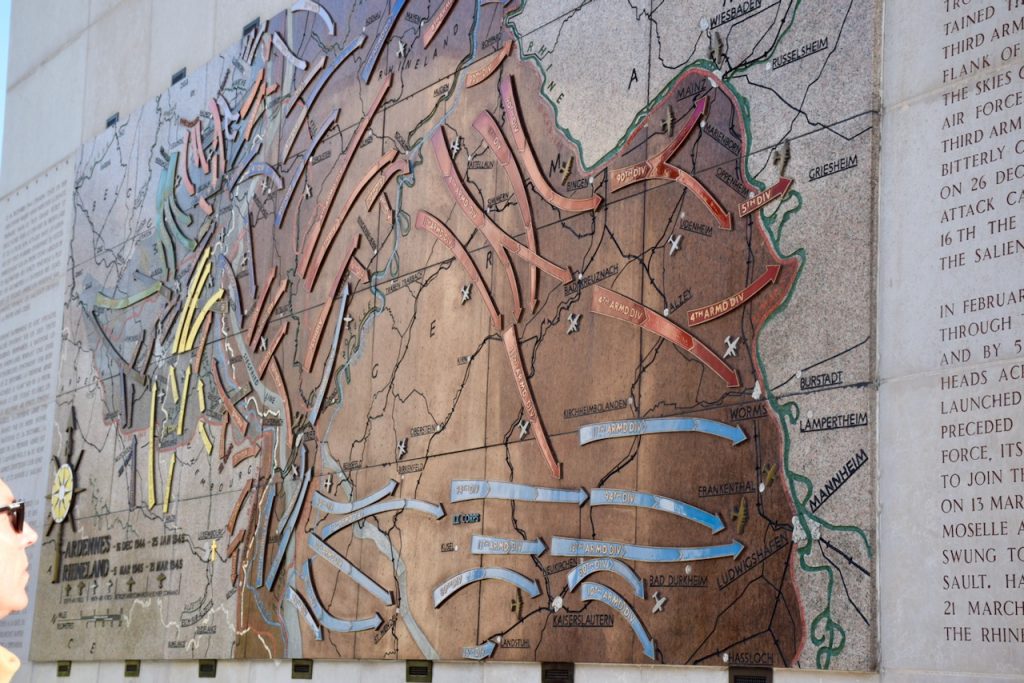
My Grandfather was captured. The other men in his fox hole with died—he was the only one left in his position. Can you imagine…a young man from a poor family in the hills of Arkansas in Europe fighting for his life alongside men who were practically strangers…the world going to hell in a handbasket…and suddenly being captured by people who did not speak your language—by the Nazis. I.just.cannot.imagine. This was not how it was supposed to go…this was not the march of victory they had hoped for. Nazi soldiers forced them to march through the snow 50 kilometers to Gerolstein and from there they either marched onward or took box cars farther into Germany.
My grandfather remarked to my cousin who recorded their conversation “The prisoners were herded like cows into a fenced pasture surrounded by guards. They were not given anything to eat or drink for five or six days. That was the awfulest time” He continued with “the prisoners were eventually loaded onto train cards for a journey of about 200 miles. The cars were so full that you could not lie down and every man had to hold his head to the side. The train was bombed by English aircraft every day. The Germans painted red crosses on ammunition and troop cars and loaded the prisoners into the others so the Allies would not destroy their supplies.” According to Indianamilitary.org, the prisoners entered these cars on December 21st and did not get out until December 26th. I find it curious that he did not say “we” or “us,” but rather “the prisoners….”
Grandpa has been wounded by a German hand grenade before his capture, and doctors at the prison camp removed shrapnel from his legs. I wonder – was the doctor a good man—did he comfort my grandfather? Was he there just to do a job, or was he part of the system? As a child (and even as an adult), I never knew he had been injured before going the prisoner camp. It was only when I sat by his bedside for days on end before he died that I learned his feet were permanently black from the frostbite he suffered from the march and from the camp… He never, ever mentioned it.
Stalag IX-B in Bad Orb just outside Frankfort was the prisoner of war camp where my grandfather stayed until they were freed by Patton’s men. According to the United States Holocaust Memorial Museum, Stalag IX-B was one of the worst camps in Germany. The camp was operating at well over twice it’s intended capacity, hygiene in the camp was non-existent and the food rations declined as the camp numbers increased. Poor sanitation and inadequate shelter caused widespread cases of dysentery and pneumonia, and the camp was infested with vermin. The water supply was an issue–especially since there were and estimated 10,000 more prisoners in the camp than initially intended. The camp had a very high death rate from the treatment they received.
Wikipedia tells this story of Roddie Edmonds in Stalag IX-B. In January, the commandant ordered all Jewish prisoners to step forward out of the daily line-up. Edmonds, a US Army Sergeant, ordered his men to disobey the order and told the Germans: “We are all Jews Here.” After being kept standing for several hours, 130 came forward, however, the commandant had been requested to send 350 men for the transport. The commandant added known “troublemakers,” the elected camp leader, and anyone who “looked” Jewish to be taken to Berga concentration camp.—-Yes that is the sound of me exhaling after typing all of this… I wonder about the thoughts going through his mind. Did he see his friends be taken away? Did he think of his family? Did he fight back tears or did he just put his mind elsewhere to get through it all? Was he concerned he would be taken, too?
When Grandpa was liberated from the POW camp by General Patton’s men, he weighed a mere 96 pounds. The freed prisoners were left to their own devices for a days in the town. After some time, the prisoners were moved to the Lucky Strike camp near La Havre, France before being sent back to the US. Later my grandpa was awarded 4 bronze stars and a purple heart, which he refused to accept because he remarked that he would not accept a medal for being wounded when so many had died or suffered worse than he. Our family accepted the medal posthumously on his behalf.
According to my mother:
Daddy never talked about the war. No stories around the dinner table of exploits with buddies or places he had seen. War memories haunted him in his sleep, as they do with all men who have been prisoners of war. I suspect that was why he watched TV until the station signed off for the night.
I never really ting of my daddy and his brothers as heroic men. They did not go looking for a fight; each one of them had been drafted into service. But once called upon by their country, they did what men do. They sucked up their courage, performed to the best of their abilities, and did their best to stay alive. The things they saw and did were not adventures, but what had to be done. And, after it was over, they did their best to bury those memories in places so deep that they only come to light in your dreams.
Last year, as I stood in front of the multitude of white crosses and stars in the American Cemetery in Luxembourg very near the spot where my grandpa was captured in the Battle of the Bulge, I pondered the idea of the men honored here were quite possibly his friends and comrades. Did they share stories of their families back home? Did they share their fears, pass cigarettes, and give each other hope they would come out alive? As they fell, did he see them? As my grandpa took each step along the snowy march to the prisoner of war camp, what were his thoughts?
I saw the grave of Patton whose men released my 96 pound grandpa from the prisoner camp, and said a silent word of thank you….willing tears not to come….he not only saved my grandpa, but ensured I would be born…
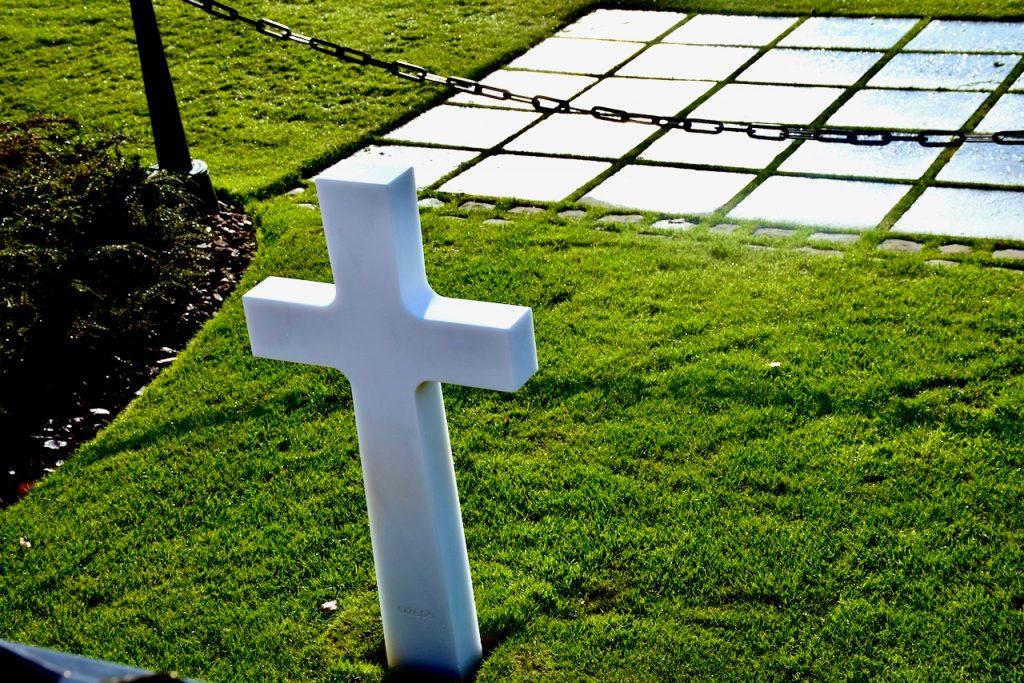
Purple Hearts and Silver Stars, The Revolution and The Civil War….WWI, WWII, Korea, Nam, Desert Storm…You Signed Up, You Went Because You Were Drafted…Heroes, Regular Joes, Badass Women, and Prisoners of War…To my ancestors who sacrificed I say thank you!! To my cousins, uncles, friends…I appreciate your service!!
Thinking of all the things on Veteran’s Day.
Next: https://bellatravelplanning.com/versailles-the-sun-king-and-all-things-golden/
Becky Lukovic is a specialist in exploring the areas in Western Europe. Like her mom, she is a history buff and has a degree in English Literature. The stories of the places are what captivate her. She lives in Roswell, GA with her husband and collection of 80s vinyl records and vintage books.

